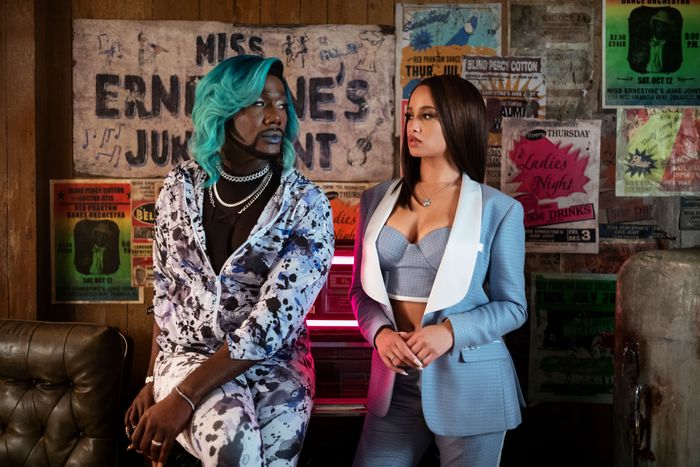
During its electrifying first season, P-Valley was unpredictable. It rejected the kind of false equivalencies (between labor and morality, or goodness and godliness) that swirl around women who choose to take off their clothes for money. It introduced characters whose motivations were complex and desires ravenous; it served them with storylines about the intimacy and claustrophobia of small towns and cinematography that emphasized the strength and sensuality of women’s bodies as they danced. But while Icarus flew, he also fell — and so does the second season of P-Valley.
Is the problem that the first eight episodes from creator Katori Hall, adapting her own play Pussy Valley, were just too good? Maybe! Because it’s not that the second season, which premieres June 3 on Starz, is a catastrophe, or fundamentally dissimilar from the first. The ensemble is still stellar at balancing the series’s defining braggadocio and vulnerability, in particular Brandee Evans as veteran dancer and aspiring gym owner Mercedes, Shannon Thornton as music-video star and domestic-abuse survivor Keyshawn, and J. Alphonse Nicholson as closeted up-and-coming rapper Lil Murda. The stunts are still mind-bogglingly impressive, especially now that the Pynk is outfitted with different types of poles, including one that doesn’t attach to the floor and swings in wild arcs alongside its dancer. (I still gasp every time a dancer does a controlled drop, and still nod in appreciation every time the music fades out and the perspective shifts so we can hear the dancer’s breaths and see their twirling, chaotic view from the pole.) And the integration of supernatural elements to emphasize the series’s Southern Gothic aesthetic brings to mind True Blood and Claws, both of which found a balance between spookiness, silliness, and soulfulness.
But how the second season does feel in the five episodes provided to critics (of ten total) is rushed, constrained, and disparate. Various cast members are shoved to the side while new ones are added without much development or backstory. Plots from the first season that seemed wrapped are regurgitated, their repetition fueled by characters’ incongruous heel turns. And unlike season one, which conjured a devastating hurricane to spark two overarching through-lines shaped by noir — a woman with a mysterious past and a shady real estate-development deal — season two leans primarily on real-life events instead of using them as impetus. The dual devastations of COVID-19 and police brutality against Black people cast impenetrable shadows over P-Valley, and the genre experimentation of the first season gets lost in that opacity. That’s not to suggest a series so thoughtful and intentional about exploring the facets of Black life in America should ignore pervasive systemic injustice or the uprising that responds to it. But P-Valley pivots almost exclusively toward anguish and the tension between crime and punishment, and that thematic swing — and the accompanying havoc it brings down upon the strip club and its “framily” — overwhelms and undermines already-established plots.
Set five months after the first season finale, P-Valley picks up again as COVID-19 has frozen Chucalissa, Mississippi, in lockdown. The town’s economy was already struggling, but the pandemic made things worse. New Pynk owner Hailey (Elarica Johnson) and predecessor Uncle Clifford (Nicco Annan) are trying to keep the dancers afloat, but without any federal assistance, they’re burning through the $250,000 Hailey paid for the club. Mercedes, suffering from a recurring injury and shocked that her mother Patrice’s (Harriett D. Foy) new church is so popular, begins to worry about her own future. After the events of Murda Night, Pynk security guard Diamond (Tyler Lepley) is off the job, Keyshawn is firmly back with abusive baby daddy Derrick (Jordan M. Cox), and Uncle Clifford is on the outs with both Keyshawn and former lover Lil Murda. Still lurking is the threat of the Promised Land Casino and Resort, whose representative, Andre (Parker Sawyers), is not quite ready to leave Chucalissa behind.
Where this season will ultimately go feels connected to its new cast members, and of that group, the mercurial John Clarence Stewart as Lil Murda’s security guard Big Teak and Gail Bean as ambitious dancer Roulette stand out. Both actors have compelling, gut-wrenching scenes in fourth episode “Demethrius” that complement the episode’s sobering end cards, and their characters fit easily into the Pynk’s myriad dramas. To share too much else about how freshman and sophomore characters cross paths would mean running afoul of P-Valley’s expansive spoiler-embargo list, which gets so granular as to ban mentions of a hairstyle change, timeline tweaks, and the store at which a few characters get into an argument. One doesn’t need to divulge all those details, though, to criticize the season’s clunky tonal shifts as it tries to balance the misery and horror of the early days of COVID-19 with the glittering excitement of a viral Instagram Live broadcast, or depictions of attempted rape with the tease of a special musical guest.
There are still gasp-worthy highlights, like an assassination scene that aligns our gaze with the victim’s and a sex scene that lingers on rapturous facial expressions, imbuing the “opposites attract” adage with sizzling eroticism. Each of these moments rekindles the visual boldness P-Valley fostered in its first season, and coupled with its continued focus on art — stripping, dancing, rapping, beat-making — as creative expression and labor, the series still wields the core elements that make it such an invigorating, subversive watch. But P-Valley is trying to do so much via splintered subplots, it’s missing the consistency and cohesion that drove the first season, as if the trinity tried to perform without Mercedes or Lil Murda got onstage without his signature grills. “It’s always something up in this bitch,” someone scoffs of the Pynk, but a scaling back of all those somethings would only help P-Valley move forward.
More From This Series
- Meghan Markle Pioneers New Frontiers in Unrelatability
- Marvel Won’t Let Daredevil: Born Again Live
- We Were Too Hard on Winning Time


